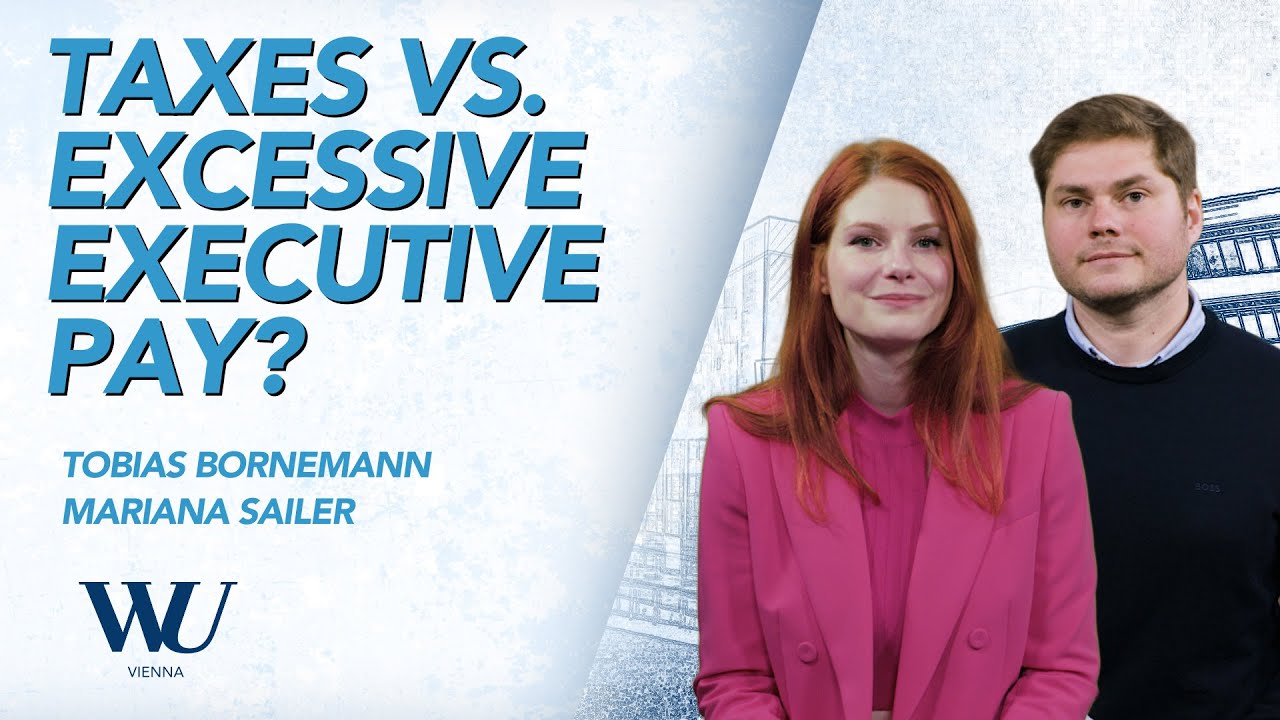Tobias Bornemann & Mariana Sailer
Rapidly rising executive salaries have been the subject of debate for decades. Can changes in tax law help to close the ever-widening pay gap? Tobias Bornemann and Mariana Sailer from the WU Department of Finance, Accounting & Statistics have investigated this question.

Executive pay is rising fast. Can…
According to the American Economic Policy Institute, CEOs of US companies earned around 20 times more than the average employee in 1965. By 1989, it was 60 times more. And today? According to 2021 figures, the salary of CEOs is now around 400 times that of the average employee.
Not only in the USA but also worldwide, executive pay levels seem to be rising steadily, with no slowdown in sight. And for a long time, there have been debates about whether the pay gap between the regular workforce and the executive suite is justified. Repeatedly, there have been attempts to regulate executive pay through the tax system. And this has been true for Austria as well. In 2014, Austrian lawmakers passed a new law, under which top-level salaries are now no longer fully tax-deductible, only up to an amount of 500,000 euros.
Tobias Bornemann and Mariana Sailer have investigated how this change in legislation has impacted executive salaries – not very much, as it turns out. The findings show that the uptick in executive salaries has hardly slowed down following the entry into effect of the new law. As they explain in our new Meet Our Researchers video, the additional taxes are hardly ever passed on to the managers.
In this interview, Tobias Bornemann explains what fascinates him about this question, what he is currently investigating in his research – and why it is important to him that his family and friends also find the results of his research important and interesting.
![[Translate to English:] Foto von Tobias Bornemann auf dem Campus WU](/fileadmin/wu/_processed_/c/2/csm_Bornemann_web_6e5f4c1d01.jpg)
“I want my research to contribute to society locally – that is, here in Austria and Europe.”Tobias Bornemann doesn't want to do research in an ivory tower. At WU, he sees an opportunity to make a difference in society with his work.
In the Meet Our Researchers video, you talk about your research on the taxation of executive salaries. What sparked your interest in this topic?
When the new law was passed in 2014, Mariana and I heard about it in the news, and immediately pricked up our ears. On the one hand, we both had a personal interest in this issue, because it had been a hot topic for years, and many people care about it. On the other hand, the topic offered an interesting connection to Austria – it was a unique opportunity to contribute to this debate here in in this country, while also answering a general question that is highly relevant. Our results can also be transferred to other countries.
Do you have a goal that you would like to achieve with your research?
On the one hand, I want my research to contribute to society locally – that is, here in Austria and Europe. This transfer of knowledge to a wider audience is very important to me. On the other hand, I would also like to make a contribution to more efficient regulation that is based on evidence and facts. It’s important to me that legislators, standard setters, and regulatory authorities can draw on empirical results to make better decisions and, for example, pass laws that are more efficient and have fewer unexpected or unintended side effects. I don’t want to work exclusively for the scientific community. I always think to myself: I want my family and friends to understand my research results and find them interesting.
And do you achieve that?
Yes, definitely! They’ve been eagerly awaiting the video, and occasionally they ask me about what I’m working on in my current research.
Your work on executive salaries was published last year. What is the focus of your research at the moment?
I’m currently working on two major topics. One is a classic question from the field of financial reporting: We’re investigating whether a more transparent presentation of hybrid financial instruments in companies’ annual reports is helpful for analysts and investors to better evaluate the businesses. On the other hand, I am currently looking at the extent to which ESG ratings can quantitatively summarize very complex and often qualitative information – especially with regard to tax transparency. Currently, the stakeholders of companies need a lot of time and expertise to assess companies’ tax positions based on their published information. External ESG ratings can help to reduce these information costs for stakeholders and make tax positions more comparable between companies. I look at whether companies become more tax transparent or reduce tax avoidance once they are rated by external rating agencies who assess their tax positions.
What do you value about WU as a workplace?
Above all, the flexibility and the resources. We have access to many databases, which makes my work as an empirical researcher much easier. You don’t always have that. It’s also important to WU that our results are made visible, be it at conferences or in the media. Of course, I also like the workplace and the great campus itself.
Do you have a favorite place on Campus WU?
Apart from research, I’m also interested in architecture. That’s why I find Zaha Hadid’s LC building very impressive, and I think it’s great that she contributed to Campus WU. But my favorite place is the garden area behind the LC building. Many people don’t even know about it, which makes it a great place to relax and unwind.
Tobias Bornemann has been an assistant professor at the International Accounting Group since 2018. His focus is on empirical research in the fields of accounting and taxation.
